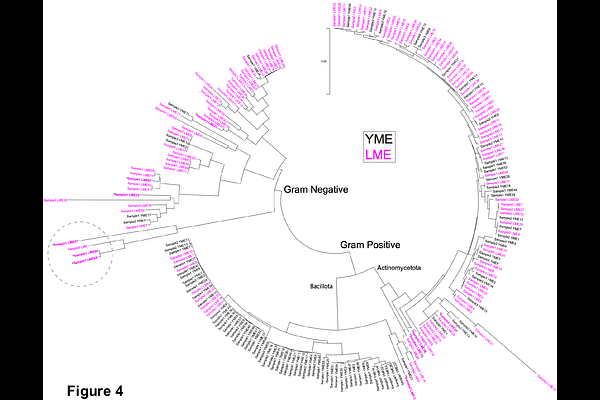Leaf Mold Agar Facilitates Recovery of Soil Bacterial Diversity Beyond Bacillus Dominance

Leaf Mold Agar Facilitates Recovery of Soil Bacterial Diversity Beyond Bacillus Dominance
Tabuchi, F.; Mikami, K.; Ishii, M.; Yasukawa, J.; Miyauchi, M.; Silva, D. P. N. d.; Miyashita, A.
AbstractDominance of Bacillus species on conventional agar media often hampers the isolation of taxonomically diverse soil bacteria (i.e., \'Bacillus dominance\'). To overcome this Bacillus dominance, we developed a novel agar medium containing leaf mold extract (LME) and assessed its utility for isolating microorganisms from soil samples. For comparison, conventional yeast malt extract agar (YME agar) was used as a control. 16S rRNA gene sequencing revealed that colonies cultured on YME agar predominantly consisted of Bacillus-related bacteria, whereas LME agar enabled the growth of a wider variety of taxa, particularly actinomycetes such as Streptomyces. Notably, LME agar supported a higher diversity of soil bacterial isolates even from samples with a low abundance of Bacillus-related species. Among the 138 isolates recovered from LME agar, some either exhibited very low 16S rRNA gene sequence identity to known species in public databases, or failed to yield 16S rRNA amplicons with conventional universal primers, suggesting the presence of previously uncharacterized or novel taxa. Furthermore, one unidentified isolate failed to grow on standard nutrient media (YME, BHI, LB10, or TSB), but proliferated in liquid leaf mold extract, indicating a specific nutrient dependency. These findings demonstrate that LME agar can facilitate the isolation of a broader spectrum of soil microorganisms (including rare and previously uncultured species) not readily recoverable on common basal media. Incorporation of ecosystem-derived substrates into culture media may greatly enhance the discovery and study of novel microbial diversity from environmental samples.